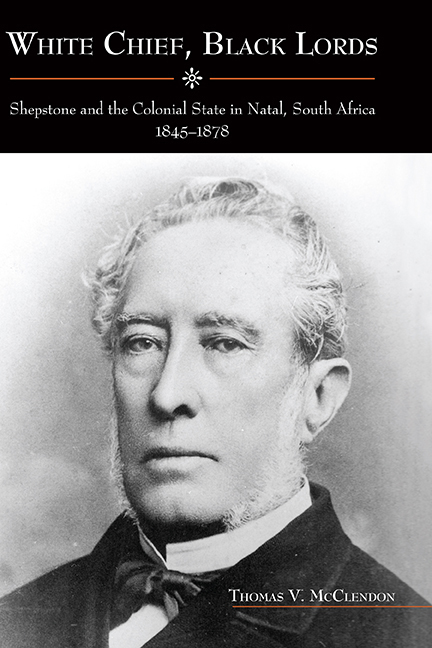Book contents
- Frontmatter
- Dedication
- Contents
- List of Illustrations
- Acknowledgments
- List of Abbreviations
- 1 Introduction
- 2 The Man Who Would Be Inkosi
- 3 Witchcraft and Statecraft
- 4 You Are What You Eat Up
- 5 Guns, Rain, and Law
- 6 From Show Trial to Shallow Reform
- 7 Conclusion
- Notes
- Glossary
- Bibliography
- Index
- Rochester Studies in African History and the Diaspora
4 - You Are What You Eat Up
Published online by Cambridge University Press: 09 May 2017
- Frontmatter
- Dedication
- Contents
- List of Illustrations
- Acknowledgments
- List of Abbreviations
- 1 Introduction
- 2 The Man Who Would Be Inkosi
- 3 Witchcraft and Statecraft
- 4 You Are What You Eat Up
- 5 Guns, Rain, and Law
- 6 From Show Trial to Shallow Reform
- 7 Conclusion
- Notes
- Glossary
- Bibliography
- Index
- Rochester Studies in African History and the Diaspora
Summary
Udl’ izinkomo ngezwayoSidoyi umntakaBaleni,
Wadl’ izinkomo zawoMatshana obezalwanguMondisa,
Wadl’ izinkomo zawoLangalibalele obezalwa nguMthimkhulu
(He seized the cattle of Sidoyi son of Baleni,
He ate up the cattle of Matshana son of Mondisa,
He ate up the cattle of Langalibalele son of Mthimkhulu)
“Somtsewu kaSonciza (Sir Theophilus Shepstone)”Introduction
On three occasions within the first thirteen years after the establishment of the British administration of Natal in 1845, subject amakhosi found themselves attacked, put to flight, and deposed by the government. In each case, the government official who coordinated the attack was Natal's powerful secretary for native affairs (SNA), Theophilus Shepstone. The third incident, the crushing of Inkosi Matshana and the breaking up of his chiefdom in 1858, presaged the infamous clash with Langalibalele in 1873. The pursuit, arrest, and trial of that important lord, and the scattering of his prosperous Hlubi chiefdom, discussed in chapters 5 and 6, became a colonial crisis that led to the end of Shepstone's lone-ranger career as SNA and to the partial bureaucratization of his functions. Each of these incidents was a contest over the symbols and exercise of authority. They were concerned especially with markers of sovereignty, including the power to inflict the punishment of death, the regulation of witchcraft, the display of arms, and the use of armed force.
This chapter will examine the first three of these affairs, those that occurred during the initial decade and a half of the British colonization of Natal, involving struggles between Shepstone and his colonial state against recalcitrant amakhosi Fodo, Sidoyi, and Matshana. In each case, the inkosi or his followers took actions that implicitly challenged the authority of the colonial state and then refused a summons to answer charges, leading the colonial authorities to draft amabutho from other subject chiefdoms to take military action against the defiant amakhosi and their loyal followers. In each case, the colonial forces succeeded relatively quickly in establishing military supremacy and in confiscating large numbers of cattle belonging to the rebellious chiefdom.
- Type
- Chapter
- Information
- White Chief, Black LordsShepstone and the Colonial State in Natal, South Africa, 1845–1878, pp. 62 - 81Publisher: Boydell & BrewerPrint publication year: 2010

